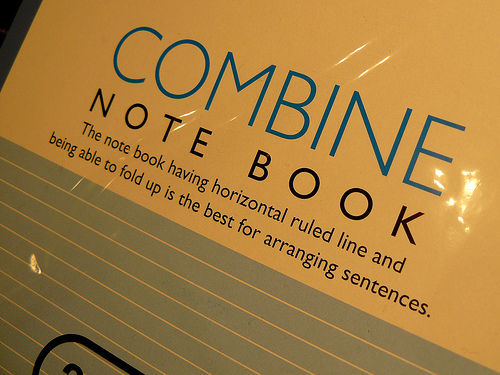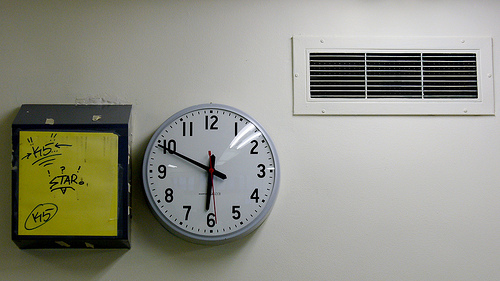
Source: Best For Arranging Sentences, sea turtle, Flickr
That’s enough guided practice and warm-up. Now it’s time to practice identifying and combining sentences in an essay. In this case, you will be revising someone else’s first draft, but pretend that you wrote this essay, and you want to check it for sentence variety. How will you do this?
If you are a good systematic thinker, you will use a strategy such as labeling to clarify what kind of sentences your writing contains. In this case, you need to see how much sentence variety is already there and where you can make adjustments to contribute to sentence variety and avoid repetitive simple-sentence constructions.
As you read the following essay, click on all the simple sentences. Remember that the subject might be compound or the predicate might be compound, but if they are grouped together on the same side of the sentence, the sentence is still a simple sentence, and you should click on it. If you choose correctly, each sentence will highlight. When you’re finished highlighting, check your understanding to see further explanation.
A Later Start for High School Students

Source: It wasn't really 6:50., cinderellasg, Flickr
Yesterday, in my world history class, I fell asleep. We were watching a movie about the Spanish Armada. I tried to keep my eyes open, but I let my lids drop for a second. I was out. I suddenly jerked awake. I realized I’d been sleeping for several minutes. Before I fell asleep, the Spanish ships were just approaching the English Channel. By the time I woke up, Sir Francis Drake had driven the Spaniards back to Spain. Sometime, I might try to figure out how Sir Francis did this so fast. For now, all I want to do is figure out how to get more sleep, preferably at night, in my own bed, instead of at my desk in school.
I’m not the only student dealing with this problem. Many of my fellow students also need more sleep. Not all of them are falling asleep in class. However, many are not at their intellectual best. They have not had enough sleep. How much am I talking about? According to an NPR report, teenagers need “about nine hours each night. ” Most of my friends don’t come close to getting that amount of sleep. The answer isn’t just getting students to go to bed earlier. For most teenagers, that won’t work. The answer is arranging things so teenagers can sleep later. This means starting school later.
Sample Responses:
If you didn’t highlight some sentences at first, ask yourself if the subject is compound or has an introductory phrase that makes it seem like a complex sentence. Ask the same question about the predicate.
If you tried to click and highlight some sentences as simple sentences that are not highlighted in the essay below, ask yourself if there are two sets of “subject + predicate” combinations in the sentence perhaps introduced with a subordinate conjunction or with a relative pronoun (that, which, who, or whom).
Now you are going to revise for sentence variety. Do not attempt to change all of the simple sentences to compound, complex, or compound-complex sentences. A reasonable number of simple sentences will add to the variety of sentence types found in the article.
Look for long stretches of highlighting. Obviously, the second paragraph could use some variety. You can combine some sentences, but for others, you may decide to add a new clause—an “although” or an “if” clause that makes your meaning clearer.
 Below is a copy of the essay in first draft form. Copy and paste the text into your notes to revise it. When you’re finished, check your understanding to see a possible revision of this essay. You can mouse over the sentences in brackets to see explanations about why they were or were not revised.
Below is a copy of the essay in first draft form. Copy and paste the text into your notes to revise it. When you’re finished, check your understanding to see a possible revision of this essay. You can mouse over the sentences in brackets to see explanations about why they were or were not revised. A Later Start for High School Students
Yesterday, in my world history class, I fell asleep. We were watching a movie about the Spanish Armada. I tried to keep my eyes open, but I let the lids drop for a second. I was out. I suddenly jerked awake. I realized I’d been sleeping for several minutes. Before I fell asleep, the Spanish ships were just approaching the English Channel. By the time I woke up, Sir Francis Drake had driven the Spaniards back to Spain. Sometime, I might try to figure out how Sir Francis did this so fast. For now, all I want to do is figure out how to get more sleep, preferably at night, in my own bed, instead of at my desk in school.
I’m not the only student dealing with this problem. Many of my fellow students also need more sleep. Not all of them are falling asleep in class. However, many are not at their intellectual best. They have not had enough sleep. How much am I talking about? According to an NPR report, teenagers need “about nine hours each night.” Most of my friends don’t come close to getting that amount of sleep. The answer isn’t just getting students to go to bed earlier. For most teenagers, that won’t work. The answer is arranging things so teenagers can sleep later. This means starting school later.
Sample Responses:
This is one possible revision. There are many, many other possibilities, some of them just as good, some of them probably better. Compare this revision to your own attempt.
Also, mouse over the bracketed sentences to read a comment about why they were revised or why they weren’t.
Labeling or highlighting sentence types can help you revise by letting you know what types of sentences your piece of writing contains. Highlighting text brings up questions: Is this sentence best left as a simple sentence, or should it be revised? Labeling your sentences won’t do the thinking for you, but this strategy can help you focus your thinking and improve your writing through sentence variety.